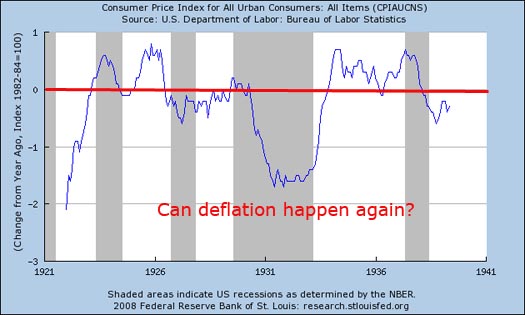So you subscribe to the Chicago Economic Theory? Interesting.
Where I believe they are right, yes. Milton Friedman's explanation for the cause of the depression is sound, if perhaps incomplete. Interestingly, in the 90's Krugman actually held the same view, that direct fiscal stimulus measures aren't necessary to counteract a recession.
This is not the current economic theory being espoused by the government. In fact, we hear consistently on this site from lefties that it "failed" and that far more government control is needed.
I think that more fiscal stimulus probably would have done us good. But since that never came in the levels that pure macroeconomic theory would suggest, the fed is having to do the heavy lifting here.
Friedman assumed rational action by government,
In what? I was talking about his explanation for the great depression. You seem to be jumping points.
as well as by companies the problem was the government control part. We had government inducing a credit bubble, and companies who could create debt and pass it on to the government in the form of bundled over-rated loans sold to companies controlled and guaranteed by the government. Rational action by a company who could make money without the responsibility? Well, obviously, do it repeatedly and often!
I think that deregulation of the banks, both de jure (repeal of Glass Steagal) and de facto (regulators in bed with the corporations and not doing their job) lead to this crisis. Every time the financial industry is deregulated, this seems to happen. And it's not like we get any sort of tremendous increases in productivity out of this. The financial sector just sits there and throws money at economic noise, ultimately doing nothing. Nothing like this occurred under a tightly regulated system. And I don't see how the government "inflated the housing bubble"; the fed kept the prime rate low, sure, but unemployment was still high and inflation was still low. Using something as broad as the prime rate as a tool to control a housing bubble would be inappropriate.
The bottom line is that the financial system holds in its hands the power to destroy the entire economy. They shouldn't be set to run free with that. Just promising not to bail them out isn't going to help things. No rational person is going to just sit there and fiddle while Rome burns, and the person who does is going to take America down with them. It is necessary that they carry a government guarantee, and with that government guarantee should come onerous regulations. Banking needs to be boring again.
We created our own bubble, ready to burst, then when it did all we did was throw a patch on that balloon and begin to reinflate it.
And here we get elements of
the Austrian business cycle theory. This was Friedman's opinion on that: In 1969, Nobel Laureate Milton Friedman, after examining the history of business cycles in the US, concluded that "The Hayek-Mises explanation of the business cycle is contradicted by the evidence. It is, I believe, false."[6] He analyzed the issue using newer data in 1993, and again reached the same conclusions.[7]
Current economic policy absolutely isn't following Friedman, the idea is almost laughable.
I never said that economic policy follows Friedman in all respects. We obviously aren't even following him in his opinion on the cause of the Great Depression, but we are doing all that he would've recommended and more.
Shoot when we said we were following his theory,
His theory on what caused the great depression? Or your impressions of his larger theory? Because that seems to be what you're bringing up over and over again...
Again, I never suggested that we were following every suggestion Friedman ever made to the tee. I said that Friedman showed that most recessions can be combated without direct fiscal stimulus. There is a big difference between what I said and how you're interpreting what I said.
we still over used government control, especially in the arena of mortgages. Banks would actually be sanctioned for not following the irrational pattern that created the debt crisis. The idea that we should absolve government, recreate the exact same policy, and add still more debt will get us out of the problem assumes an ignorance of the root cause of the problem to begin with.
The CRA is an ancient piece of legislation. If it necessarily caused the banking industry to collapse, you would've expected it to do so 20 or 30 years ago. Deregulation, on the other hand, is much more recent. What piece of legislation was repealed almost right before the housing boom? It starts with "Glass" and ends with "Steagal". There are two words.
Current policy is clearly Keynsian,
More like neoclassical with Keynesian influences. What we're doing now really isn't as radical as what pure Keynesian economics would suggest; nor does it necessarily have to be.
without the rationality of that theory as well. Spend freely in down times on stuff we will need to spend on the future anyway, but pay it down during good times... In this case we ignore the part where we should be spending on things we will need to spend on in the future anyway, and we've never followed the "good times" part where we actually lower the debt...
In the 2000's, the deficit didn't matter to the Republicans. Their proposition then was to lower taxes on the rich and privatize social programs. Now that the deficit is suddenly the biggest issue in the universe (at a point in time when we have an excuse to be running at deficit), the Republican solution is also to lower taxes on he rich and privatize social programs. Imagine.
We've never followed either of these theories, not since 1962. We've flirted with a mix of both playing with regulation to the detriment of both theories of economics.
Well, due to the separation in power, it's very difficult for a new order to just entirely override the old one. We've definitely been going in a deregulating direction sense 1980; the fact that we haven't repealed all regulation doesn't mean that we haven't introduced a relatively deregulated environment.







